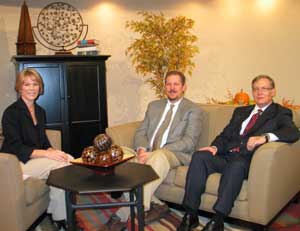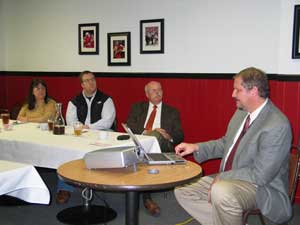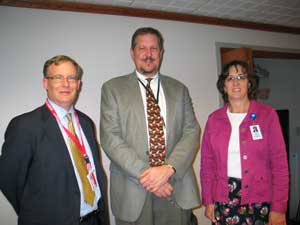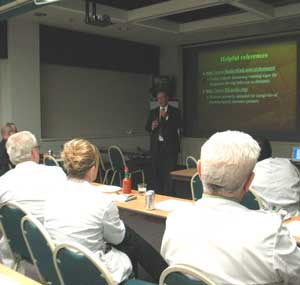 |
From left: NTV’s Good Life host, Peggy Malzacher, prepares to do a live television interview with UNMC’s Steve Wengel, M.D., and Carl Greiner, M.D., in Kearney. |
 |
In Holdrege, Steve Wengel, M.D., right, discusses the symptoms of executive dysfunction with Charlotte Wirges, M.D., left, Ryan Klenner, second from left, and Thomas Smith, M.D. |
 |
From left: Carl Greiner, M.D., and Steve Wengel, M.D., greet Sue Hardessen, care management coordinator at Ogallala Community Hospital. |
 |
Carl Greiner, M.D., explains how executive dysfunction impacts legal and financial matters to health care professionals at Good Samaritan Health Systems in Kearney. |
It can happen to almost anyone including young children and teenagers who have suffered a brain injury or head trauma from a skateboarding fall, motorcycle accident or other injury.
With more soldiers returning from Iraq and Afghanistan with traumatic brain injuries from explosive devices, psychiatrists expect more families will experience a loved one with vulnerable brain.
Carl Greiner, M.D., UNMC professor of psychiatry, said a key difference between executive dysfunction and Alzheimer’s disease is how family members describe the behavior of their loved one.
“When family members say, ‘Dad is having trouble with his memory,’ that may be an indicator of Alzheimer’s disease. But when the family says, ‘Dad is acting strange, not like himself,’ that’s a possible indicator of executive dysfunction,” Dr. Greiner said.
On a mission
Because executive dysfunction is not a household term yet, psychiatrists said it is often not diagnosed.
That is why Steve Wengel, M.D., chairman of the UNMC psychiatry department, and Dr. Greiner recently took their message about this syndrome to health care professionals in five different cities across western Nebraska.
“Ninety out of the 93 counties in Nebraska are psychiatric shortage areas,” Dr. Wengel said. “So, our effort to provide education across the state is extremely important. Training local family practice doctors, internists, nurses and other health care providers is essential in improving the care of people who may have vulnerable brain.”
Dealing with executive dysfunction
Inappropriate comments, impulsiveness, change in behavior, lack of judgment and insight are some of the symptoms that could lead to a diagnosis of executive dysfunction.
An upstanding deacon in the local church who starts swearing and an elderly woman who suddenly starts driving impulsively are examples of executive dysfunction cases.
“The lights are on but no one is home,” Dr. Greiner said. “Patients can remember their behavior but cannot connect the dots enough to know that their actions are often socially inappropriate.”
|
“As a forensic psychiatrist, I’ve been involved in cases where a caregiver has taken hundreds of thousands of dollars from a patient,” Dr. Greiner said. “The patient could not have given permission to donate to the education fund of the caregiver’s children.”
Drs. Wengel and Greiner’s presentation, use of humor and on-the-spot demonstrations helped health care professionals understand the syndrome, how to diagnose it and assist family members who are caring for a loved one.
“It’s been described in the medical literature more than a hundred years but now scientists have a name for it and are working to establish uniform criteria to diagnose it,” Dr. Wengel said.
After a battery of psychological and neurological testing to confirm the diagnosis, the best treatment so far is structure, structure, structure.
Family members are encouraged to structure the environment of a relative with executive dysfunction. While some drug therapies are being tested, they have not received FDA approval for treatment of executive dysfunction.
Holdrege, McCook, Ogallala, North Platte and Kearney
Local physicians, nurses and surgeons made up most of the audience for Drs. Wengel and Greiner. But besides gaining medical knowledge, the presentation often struck a personal note.
Along the trip, several people shared that they either knew a patient or recalled personal stories of family members who may have had executive dysfunction.
Health care workers said they found the information interesting and helpful.
“It’ll cause us to think about some of the symptoms our patients present with and not call them all Alzheimer’s” said Sue Hardessen, care management coordinator at Ogallala Community Hospital.
“It’s a part of our strategic plan,” said Sheri Alber, medical staff coordinator at Phelps Memorial Health Center in Holdrege. “Our doctors have told us they want to learn more about psychiatry and have additional resources. So it’s exciting UNMC would include us on their tour.”
Drs. Wengel and Greiner said they were pleased with their reception and the interest from the medical community.
“I thought executive dysfunction is more common than people realize and that if we got a chance to present it — it would resonate with people and it did,” Dr. Wengel said.
Not a one-way street
While health care professionals gained much from Drs. Wengel and Greiner, the two learned a great deal from the visits to each stop. They toured the hospitals, met administrators and staff and saw their equipment and capabilities first-hand.
Much of what they saw was impressive.
“Seeing the hospitals really redefined the concept of a hospital,” Dr. Wengel said. “A community hospital must care for a variety of needs from in-patient to out-patient, rehabilitation and even sleep studies.”
“I was really struck by the excellent facilities at Richard Young Hospital in Kearney,” Dr. Greiner said. “The commitment to creating the right environment for mental health care is an example for others to follow.”
More collaboration between facilities could come as a result of these visits. In North Platte and Kearney, Drs. Wengel and Greiner met staff interested in working with UNMC psychiatry residents. Staff psychiatrists believe the variety of diagnosis in rural patients could offer new opportunities for our students.
Media interviews
Besides the grueling schedule of drive time, presentations and hospital tours, Drs. Wengel and Greiner also were interviewed a dozen times by local newspapers, radio and television stations.
Because family members are often the first to notice the change in behavior and judgment, they felt it was important for the public to learn about executive dysfunction. They hope the information they gave the media outlets will ease the confusion or frustration many people often feel when interacting with relatives who may have executive dysfunction.
“We think this is an underappreciated syndrome,” Dr. Greiner said. “The medical community hasn’t talked about it much and the lay public doesn’t know much about it at all.”
Well worth it
Although it was a whirlwind trip, Drs. Wengel and Greiner said it was well worth it. The positive feedback from local doctors and nurses as well as the enriching experiences gained from meeting staff and touring the facilities made for a successful trip.
“We would like to thank John Navis in the continuing education department for his hard work in organizing this trip,” Dr. Wengel said. “His contacts in rural Nebraska and knowledge of the various cities contributed to our valuable experience.”